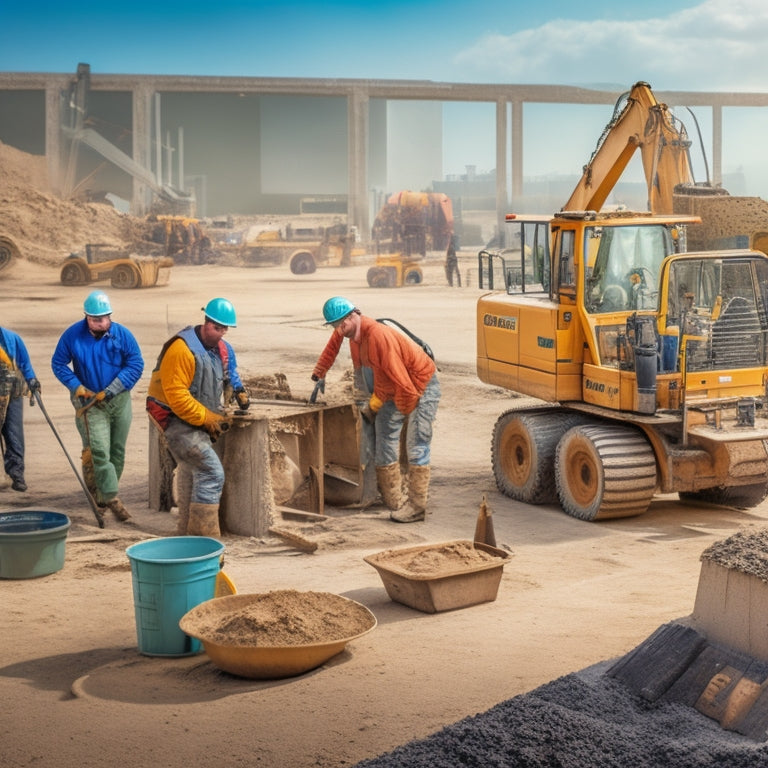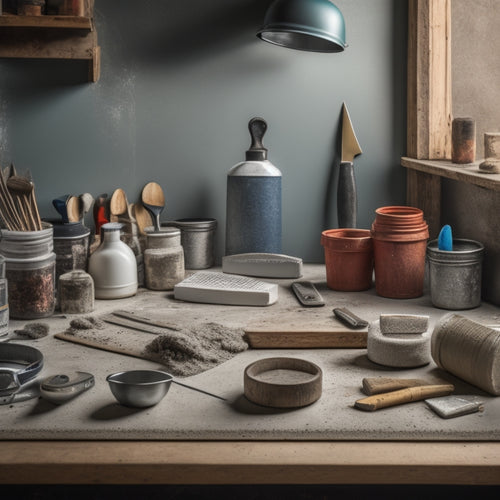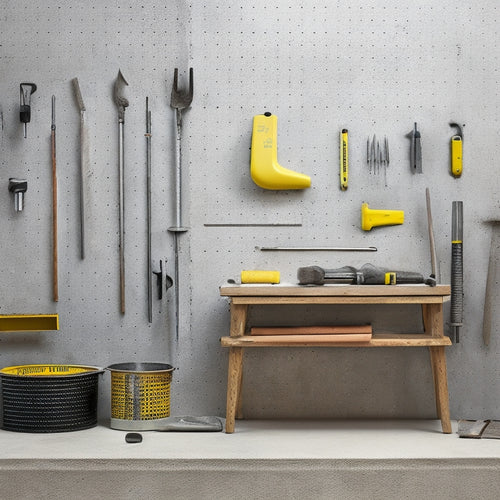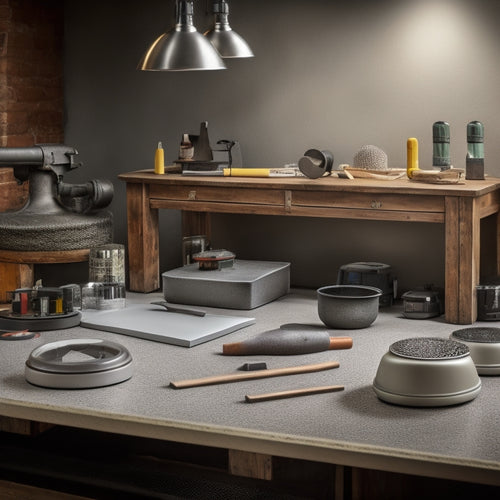
Top 5 Tools to Get for Concrete Construction
Share
You'll need a concrete mixer, pouring bucket, tamping rod, finishing trowel, and laser level to set a strong foundation for your concrete construction project. A high-quality concrete mixer guarantees efficient mixing, while a pouring bucket with a chute provides control over concrete flow. A tamping rod compact and smooths out the concrete, and a finishing trowel helps with final touches. A laser level projects accurate lines for level and plumb pours, guaranteeing a professional finish. With these essential tools in your arsenal, you'll be well on your way to a successful project, and exploring the other crucial tools and techniques will further refine your skills.
Key Takeaways
• Invest in a high-quality concrete mixer, such as a planetary or turbine mixer, for efficient and thorough mixing.
• A pouring bucket with a chute or spout is essential for controlling concrete flow and achieving precise pours.
• A laser level is crucial for projecting accurate lines and ensuring level and plumb pours.
• A tamping rod is necessary for compacting and smoothing out concrete, removing air pockets and achieving a professional finish.
• Safety glasses and a hard hat are vital for protecting yourself from flying particles, debris, and other hazards on the construction site.
Essential Mixing and Pouring Tools
You'll frequently rely on a robust arsenal of mixing and pouring tools to guarantee a successful concrete construction project, and having the right ones at your disposal is essential.
When it comes to mixing, you'll need a range of tools to achieve the perfect consistency. A high-quality concrete mixer, such as a planetary mixer or a turbine mixer, is a must-have for efficient and thorough mixing. Additionally, a mixing stick or paddle will help you scrape the sides and bottom of the mixing bucket, ensuring all ingredients are well incorporated.
When it's time to pour, you'll need tools that facilitate smooth and accurate placement of the concrete. A pouring bucket with a chute or spout will give you greater control over the flow of concrete, reducing spills and mess.
You'll also need a range of pouring methods, such as a belt conveyor or a pump, to reach difficult areas and achieve the desired mixing techniques.
Must-Have Tamping and Finishing Tools
With your freshly poured concrete in place, it's now time to focus on achieving a smooth, even finish, and that's where your tamping and finishing tools come into play. These tools are essential in ensuring your concrete project turns out flawless and professional-looking.
To master tamping techniques, you'll need the right set of tools. Here are three must-haves:
-
Tamping rods: These long, sturdy rods help you compact and smooth out the concrete, removing any air pockets and excess water.
-
Finishing trowels: Used for applying the final finishing touches, these trowels come in various sizes and shapes to suit different concrete projects.
-
Edgers: These tools help create a clean, defined edge around your concrete project, giving it a polished look.
Critical Cutting and Shaping Tools
How do you efficiently cut and shape concrete to achieve precise angles and curves, especially when working with complex designs or intricate patterns? This is where critical cutting and shaping tools come into play.
Diamond saws are a must-have for making precise cuts in concrete. These saws are equipped with diamond-coated blades that can slice through concrete with ease, leaving a clean and accurate cut.
For more intricate shapes and curves, you'll need a concrete grinder. These powerful machines use rotating abrasive discs to grind and shape concrete, allowing you to achieve smooth, curved surfaces.
When choosing a concrete grinder, consider the type of project you're working on and the level of precision required. Some grinders are designed for heavy-duty use, while others are better suited for smaller, more detailed work.
Handy Measuring and Leveling Tools
Accurate measurements and precise leveling are essential in concrete construction, and having the right tools for these tasks can make all the difference in guaranteeing a project's success. You can't afford to compromise on accuracy, and that's why you need reliable measuring and leveling tools.
Here are three must-have tools for precise measurements and leveling:
-
Laser levels: These tools project a level line or dot onto a surface, guaranteeing that your concrete pours are perfectly level and plumb. They're especially useful for large projects or when working with complex layouts.
-
Tape measures: A good tape measure is a staple in any concrete construction project. Look for one with a rugged design and accurate markings to guarantee precise measurements every time.
-
Digital angle finders: These tools help you measure angles and inclines with precision, making it easier to achieve perfect slopes and angles in your concrete pours.
Vital Safety and Protection Gear
Protecting yourself from hazardous materials and harsh environments is vital in concrete construction, and that's where significant safety and protection gear comes in.
As you work with concrete, you'll encounter harsh chemicals, heavy machinery, and physical demands that can put your health at risk. It's important to invest in high-quality protective equipment that meets strict safety regulations.
You'll need a hard hat, safety glasses, earplugs, and a dust mask to shield yourself from flying debris and airborne particles.
Steel-toed boots, gloves, and high-visibility vests will also help prevent injuries and guarantee you're visible on site.
Don't forget a first aid kit and a fire extinguisher to address emergencies.
Frequently Asked Questions
Can I Use a Regular Drill for Mixing Concrete?
When you're thinking of mixing concrete, you might wonder if a regular drill will do the job.
But, honestly, you shouldn't use a standard drill for mixing concrete. It's not designed for the task and can lead to uneven mixing, worn-out bits, and even motor burnout.
Instead, opt for a heavy-duty drill or a specialized mixer with the right drill types and mixing techniques to guarantee a smooth, consistent finish.
How Often Should I Clean My Concrete Tools?
You're the master chef of concrete construction, and your tools are the secret ingredients to a recipe for success.
How often should you clean your concrete tools? Think of it like maintaining a precision machine - regular cleaning is essential to prevent clogs and corrosion.
Aim to clean your tools after every use, and perform a deep clean weekly. This frequency guarantees ideal tool maintenance, extending their lifespan and assuring a smooth workflow.
Are Concrete Construction Tools Suitable for DIY Projects?
When tackling a DIY concrete project, you'll need to take into account the suitability of concrete construction tools for your task.
The good news is that many professional-grade tools can be adapted for DIY use, but safety equipment is paramount.
You'll need to invest in personal protective gear, such as gloves and goggles, to guarantee a safe working environment.
Can I Rent Concrete Construction Tools Instead of Buying?
When considering concrete construction tools, you're likely weighing the cost comparison between buying and renting.
Renting can be a smart move, offering several advantages. For instance, you'll avoid the hefty upfront cost of purchasing, and maintenance won't be your responsibility.
Rental companies typically handle upkeep, ensuring tools are in good condition. This approach also provides flexibility, allowing you to access specialized tools for specific projects without long-term commitments.
Do I Need to Be Certified to Operate Concrete Tools?
Just like a master builder needs a solid foundation, you need the right credentials to operate concrete tools.
You're probably wondering, 'Do I need to be certified?' The answer is, it depends on the tool and your location.
Familiarize yourself with certification requirements and safety guidelines in your area. For instance, OSHA may require certification for operating heavy machinery like cranes or excavators.
Ascertain you're compliant to avoid costly mistakes and guarantee a safe working environment.
Conclusion
You've made it to the end of this concrete construction toolkit guide!
By now, you've got the top 5 tools to get your hands on to guarantee a solid foundation, literally.
With these essentials, you'll be mixing, pouring, tamping, finishing, cutting, shaping, measuring, and leveling like a pro in no time.
Remember, having the right tools is like having a superpower - you'll be constructing concrete masterpieces in record time, and your competition will be left in the dust!
Related Posts
-

Essential Tools for Concrete Wall Covering Projects
When tackling a concrete wall covering project, you'll need a range of essential tools and equipment. For cleaning an...
-

10 Must-Have Tools for Concrete Repair Organization
You'll need a solid organization system to keep your concrete repair tools and materials within easy reach, protected...
-

10 Best Tools for Sealed Concrete Finishing Success
When it comes to sealed concrete finishing success, you need a robust arsenal of specialized tools. Start with essent...


